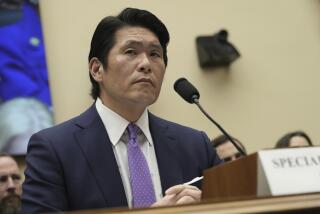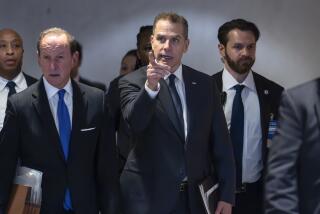First Lady Files Whitewater Affidavit at Panel’s request
- Share via
WASHINGTON — In a sworn affidavit requested by the Senate Whitewater Committee, First Lady Hillary Rodham Clinton on Monday denied knowing how her missing law firm billing records turned up in the White House living quarters, while her attorney, David E. Kendall, accused the Republican-controlled panel of carrying out a “last-minute hit-and-run smear.”
Mrs. Clinton’s brief affidavit was filed in response to an eleventh-hour request from the committee’s chairman, Sen. Alfonse M. D’Amato (R-N.Y.), as the panel prepared to wrap up its 13-month inquiry. It represented her first sworn testimony to the committee, although senators have had access to other statements that she has made to federal investigators.
“I do not know how the billing records came to be identified” by a White House aide or wound up in a book room on the third floor of the executive mansion, Mrs. Clinton said in her statement.
Accompanying her affidavit, which echoed the position she has taken in press interviews, was a sharply worded letter from Kendall, heaping sarcasm on the panel.
On the eve of official publication of the Republican-controlled committee’s final report on the Whitewater matter, most of which was leaked to the press over the weekend, Kendall said that it was “plain to the public that the majority [Republican] report is simply the politically preordained verdict of a partisan kangaroo court.”
“It simply makes no difference what information we furnish you,” Kendall told D’Amato. Borrowing from a British classic, he added:
“The special committee majority has adopted the procedural style of the Queen of Hearts in ‘Alice in Wonderland’: ‘Sentence first, evidence afterwards.’ ”
Key parts of the Republicans’ draft report accuse White House aides of misusing and abusing their power by seeking to thwart federal investigations into Whitewater-related events and using confidential law enforcement data to try to shield the Clintons from legal trouble.
The report also views Mrs. Clinton as the only suspect in the sudden appearance in the White House last January of long-sought billing records for her past work as a lawyer for Madison Guaranty Savings & Loan Assn. in Little Rock, Ark., the failed thrift that is at the heart of the Whitewater investigation.
*
In addition, Republicans accuse her, based on circumstantial evidence, of having directed aides to limit the search of White House lawyer Vincent Foster’s office after his suicide in July 1993, in an effort to prevent incriminating documents from being found.
Democrats on the committee are scheduled to issue a separate report today challenging the majority’s conclusions.
In her affidavit, the first lady said that she saw her billing records in 1985 and 1986 when her former Little Rock law firm was seeking payment from Madison Guaranty and that she recalls discussing her legal work during the 1992 presidential campaign, when some reporters began asking about the issue.
These discussions were with Foster and Webster L. Hubbell, her law partners at the time, she said, but she had no further contact with the documents. Hubbell, who later became a high-ranking Justice Department official, pleaded guilty last year to overbilling clients and cheating his law partners. He is serving a federal prison term.
An FBI analysis showed that Foster’s fingerprints and those of Mrs. Clinton were found on the records but the analysis could not determine when they were placed there and thus it shed no light on who may have handled the records after they were subpoenaed in January 1994.
The first lady’s affidavit did not respond to a Republican majority request for her recollection of a 1986 conversation with Don Denton, who recently told U.S. bank examiners he had warned Mrs. Clinton that a Madison loan transaction she was handling might be improper.
Denton, who headed Madison Guaranty’s loan department, said that Mrs. Clinton abruptly dismissed his concerns about some aspects of the so-called Castle Grande real estate deal that bank regulators have termed “a sham transaction.”
*
Kendall, in his letter to D’Amato, characterized “the Denton evidence” that was first disclosed by the committee last week as “a last-minute hit-and-run smear.”
“Mr. Denton’s sudden recollection of a 12-minute phone call with Mrs. Clinton over 10 years ago is wholly unreliable,” Kendall said.
The committee’s Republican counsel, Michael Chertoff, expressed dissatisfaction with the first lady’s affidavit.
Chertoff said that it remained unclear what Mrs. Clinton might have known about the appearance of her billing records on a table in the White House residence last August and where they had been since 1992. He also suggested that she had not fully addressed the question about the Madison Guaranty files.
More to Read
Sign up for Essential California
The most important California stories and recommendations in your inbox every morning.
You may occasionally receive promotional content from the Los Angeles Times.













